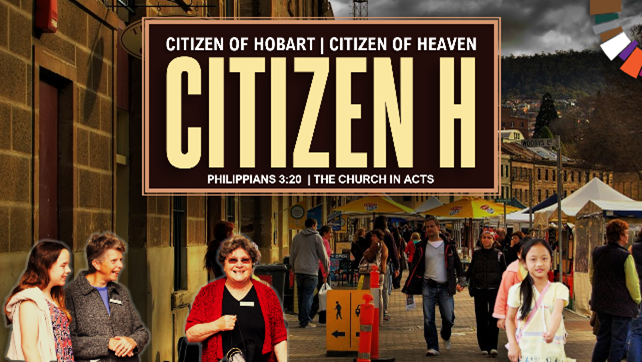CITIZEN H Sermon Series

October 4 – December 13, 2020
In this series we will look at the experience of the early church as Luke describes it in the first half of Acts. Here, we read the story of how we can take the message of Jesus across social, ethnic and religious boundaries in the face of stiff opposition.
Introduction
Being a citizen is important and is desirable. A citizen is an inhabitant of a nation who not only gives allegiance to its government, but is entitled to its protection and privileges.
Being a citizen of heaven is a lot like being a citizen of any country. It requires allegiance to its government along with its privileges, responsibilities and blessings.
Read more about the sermon series, below the sermon schedule.
Sermon Schedule
| Date | Text | Focus | Preacher |
| Oct 4 | Acts 1:1-11 | A fresh start: witnesses = resident aliens WATCH >>> . | Stephen Baxter |
| Oct 11 | Acts 2:1-16, 36-41 | A fresh start: The Gift of Life WATCH >>> . | Stephen Baxter |
| Oct 18 | Acts 2:42-47 | A fresh start: A new community WATCH >>> . | Scott Ambrose |
| Oct 25 | Acts 4:1-22 | Courage and resolve in the face of opposition WATCH >>> . | Stephen Baxter |
| Nov 1 | Acts 4:23-35 | Confrontation: How to pray WATCH >>> . | Stephen Baxter |
| Nov 8 | Acts 5:17-32, 41-42 | Confrontation: Worthy of suffering disgrace WATCH >>> . | Liam Conway |
| Nov 15 | Acts 8:1-8, 14-17 | Crossing boundaries: Samaria and Samaritans WATCH >>> . | Michael Henderson |
| Nov 22 | Acts 8:26-40 | Crossing boundaries: Ananias meets Saul WATCH >>> . | Stephen Baxter |
| Nov 29 | Acts 9:19b-30 | Crossing boundaries: Welcoming the persecutor? WATCH >>> . | Joel Ortiz |
| Dec 6 | Acts 10 | Crossing boundaries: Peter and Cornelius WATCH >>> . | Michael Henderson |
| Dec 13 | Acts 11:19-26 | Crossing boundaries: Speaking to Greeks WATCH >>> . | Stephen Baxter |
A “Colony of Heaven”
The city of Philippi was a colony of Rome, situated within the country of Greece. Paul uses this imagery to picture the church as a ‘colony of heaven’ situated on earth. In just the same way that the Greeks living in Philippi lived as Roman citizens, the Christians, though living in Philippi, are to live as “heavenly” citizens living out the values of the Kingdom of God.
But our citizenship is in heaven. And we eagerly await a Saviour from there, the Lord Jesus Christ . . .
Philippians 3:20
When Paul writes to the Christians at Philippi saying, “our citizenship is in heaven” he is not talking about a future destination, but a present reality. It’s all about how to live day-to-day on planet earth when our allegiance is to Jesus, as Lord and King.
Paul goes on to say that as citizens of heaven, “we eagerly await a Saviour from there, the Lord Jesus Christ.” As we live today and look to the future, our anticipation is not that we will be taken away from this world, but that Jesus will return. This is the day when the prayer, “your kingdom come, your will be done on earth as it is in heaven,” will be fulfilled.
What this means for us, today
Being citizens of heaven is like being members of another country. Our attitudes and lifestyle will not be the same as the world around us, but aligned to the country to which we belong, the kingdom of God and the gospel of Christ.
In this series we will look at the experience of the early church as Luke describes it in the first half of Acts. Here we read the story of how these citizens of heaven take the message of Jesus across social, ethnic and religious boundaries in the face of stiff opposition.
The message that Jesus is Messiah contradicts and unsettles the world. Whether it is the world of Roman authority, the world of Jewish certainty, or the world of Greek sophistication, Jesus is dangerous. He refused to tone down his message to make it more palatable to the authorities. His followers do the same, and turn the world upside down.
What does it mean for us, citizens of Hobart and citizens of Heaven, to follow in their footsteps? What does that mean for us? How are we to live?
